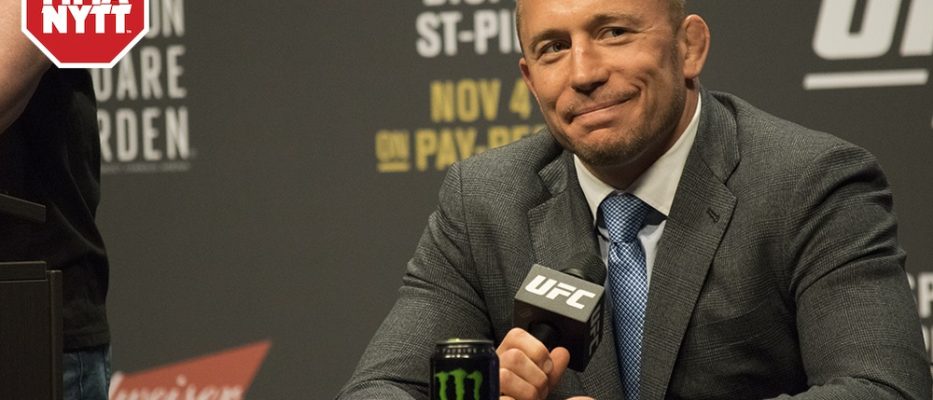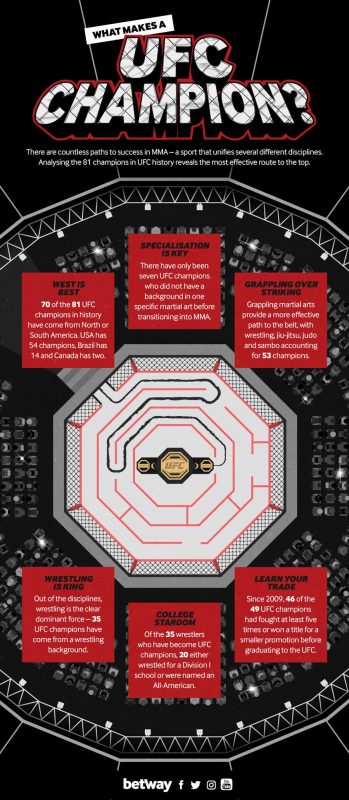
What makes a UFC champion?
There are countless paths to the UFC title, but crunching the numbers between the 81 champions in the history of the UFC reveals the most effective route to becoming the best.
There is no single path to becoming a successful professional athlete. This is particularly true for mixed martial arts, and for those who have earned the most prestigious honour in the sport: the UFC title, there are in fact approximately 15 different disciplines within the fight game, ranging from wrestling and jiu-jitsu to boxing and kung fu.
As a result, there are opportunities for athletes competing in those sports to transition seamlessly onto the UFC scene.
Take UFC featherweight champion, Max Holloway, who started out in kickboxing at high school before discovering MMA. His opponent however was a standout wrestler at college before making his MMA debut on just a few weeks of training.
These two fighters alone demonstrate the different routes available to martial artists seeking an opportunity in the UFC, where there is much more money to be made than within their starting disciplines.
Since championships were introduced in the UFC in 1997, 81 fighters of all different backgrounds and nationalities have managed to gain that prestigious belt.
We came across the below research buy Guy Giles from Betway UFC:
- A fighter’s favoured discipline before MMA is extremely important – it dictates the way they fight in the octagon and, according to the statistics, plays a part in how successful they can be.
- Of the 81 champions crowned by the UFC to date, 53 came from a background in grappling.
- Of those 53 champions, 35 took up wrestling as their dominant martial art before moving into MMA. That is 43 per cent of all UFC champions to date, a far higher proportion than any other discipline.
- The other major grappling discipline, Brazilian jiu-jitsu, has produced the second-most UFC champions with 17.
- There have been just five UFC champions with a specialist background in the world’s biggest combat sport: boxing.
- It’s clear, then, that anyone hoping to be the next Conor McGregor or Amanda Nunes would be best advised to focus on their wrestling.
- You cannot, however, look at discipline without considering nationality.
- Mixed martial arts is a truly universal sport, with most countries and cultures tied to some form of fighting.
- Wrestling, despite having origins in Ancient Greece, is a sport most associated with one country: the USA.
- It follows, then, that 54 of the 81 UFC champions to date have been American.
- Not all champions hailing from the USA come from a wrestling background, but the sport’s place in American society has certainly played a part in their dominance of the UFC belts.
- That Brazil is second on the list with 14 champions is also not a shock, given that jiu-jitsu is the second-most successful martial art in UFC history.
- The only other countries that boast more than one UFC champion are Canada and the Netherlands, with two each.
- It’s clear that fighters who grew up in the USA and took up wrestling at an early age have historically had an advantage in their pursuit of a UFC belt.
- But other factors, such as collegiate success, also come into play.
- Of the 35 champions with a background in wrestling, 20 either represented a Division I school, earned All-American honours or won a national championship at university.
- This means that they competed and excelled at the highest level of university sport which, in the USA, is essentially of professional standard.
- Wrestling at such a level at a young age has, therefore, helped more than a quarter of UFC champions reach the pinnacle of the sport.
- A fighter’s first steps into professional MMA are also important.
- Of the 81 champions in UFC history, 68 either fought at least five times or won a belt for a smaller promotion before being called up to the UFC.
- That is 84 per cent who learned their trade at a lower level before making the leap to the top.
- That number is even higher when you only look at the last 10 years, with 46 of 49 champions crowned since 2009 having first developed at a lower level before making the jump to the UFC.
- Considering all of this, then, it’s possible to map the most effective route to a UFC title.
- An American upbringing is a good place to start, with an early introduction to wrestling the next step. College stardom follows, before a successful stint in a smaller promotion helping to catch the eye of UFC president Dana White.
- The numbers suggest that this has been the ideal path historically but, as with all sport, things are changing in MMA.
- Remember those five champions with a specialist background in boxing? All five became a UFC champion from 2015 onwards.
- Thanks to the success of former boxers like McGregor and Holly Holm in the UFC, MMA is finally being viewed as a viable career path for those who may not have what it takes to become the next Anthony Joshua or Tyson Fury.
- The same trend is present when looking at striking more generally. Since 2015, 14 of 28 champions have come from such a background.
- And of those 11 champions hailing from outside the Americas, nine were crowned UFC champion from 2015 onwards.
- This makes it clear that, while MMA is in essence a global sport, the UFC is finally beginning to have serious appeal around the world.
- The days of an America-centric, wrestling-heavy promotion are coming to an end, with the UFC now beginning to live up to its name as the ‘Ultimate Fighting Championship’.
The infographic and research was taken from ‘What makes a UFC Champion?’.











